2021 was a hard year for me, so I’ll keep this reflection short. Let’s talk about autumn 2021 and my latest semester of teaching!
Table of Contents
- Logistics
- Reflection
- Feedback
- Changes
- Looking Forward
Logistics
At this point in the series, it’s probably somewhat tiring rehashing the same details. So, here’s what I’ll say! This semester I was once again teaching the Software Components course. This course was all in person this time, so masks were a must. Despite that, I still had my usual share of 40 students with four meetings a week.
This time around, I had the last course of the day at 4:10 PM until 5:05 PM. As a night owl, I quite enjoyed this late class period, and it lined up nicely with all my grad classes. Also, it allowed me to hold office hours pretty much right after class since the buildings were otherwise empty.
At any rate, grades were more or less where they always were. Not much to say other than I try my best to support students. As a result, I tend to reflect lower grades on myself as my failure to support those students. We’ll talk more about that later, but at any rate here are the grades:
| Grade | Count |
|---|---|
| A | 7 |
| A- | 3 |
| B+ | 6 |
| B | 5 |
| B- | 2 |
| C+ | 1 |
| C | 4 |
| C- | 1 |
| D+ | 1 |
| D | 3 |
| E | 3 |
| EN | 1 |
| I | 1 |
| W | 1 |
With that out of the way, let’s talk about what I learned this semester!
Reflection
You may remember that I wasn’t sure I was going to get back into teaching since transitioning to a new department. Well, the cool thing is that I somehow got my job back! As a result, I expect this reflection to have less of a somber tone and more of a tone of looking ahead toward progress.
The Good
There was a lot to be happy about this semester. In general, I had a very strong class with students who were all willing to deal with my need to build community in the classroom. Overall, I was very pleased with teaching this semester.
One thing I was particularly happy with were the rubrics that I tried out this semester. Something I’ll be interested in looking into is if the rubrics improved student grades. In the short term, I at least know that students liked the new rubrics (more on that later).
Another thing I really enjoyed this semester was watching my students bond with each other. To me, the ultimate goal as an educator is to never be needed. This semester I saw that at various times in the class where students would turn to each other to get their questions answered. Hopefully, they carry that skill into the real world.
Since we’re talking good things, I have to bring up the connections I made with many students. Overall, I really felt like I connected with most of my students this semester—even through a mask. I’m wondering if coming out of this pandemic is making folks more open to support from each other.
The Bad
I really don’t have many complaints this semester. I only had one student who really pushed my buttons throughout the semester. Everyone else seemed to be respectful and supportive.
As usual, we had a very small group of cheaters during the semester. My approach this time was to work with the students directly to make sure they knew the academic integrity policy rather than punishing them outright. This seemed to work and saved me time dealing with academic integrity cases.
Also, I had one student who was dealing with some serious medical issues that caused them to miss a lot of class. I felt really bad for them and wished I could support them more. In fact, I’ll probably reach out now…
One last thing I should mention was that I tried being significantly more flexible with assignment deadlines. For the most part, I think this went well. That said, there were a few folks who I felt were trying to take advantage of the generosity.
Beyond that, I’m content! Sorry this reflection was so light this time around. I just don’t really have much to say.
Feedback
As always, I collect a lot of student feedback. This year, I took advantage of three main forms of feedback:
- A course evaluation survey
- An assignment feedback survey
- A student evaluation of instruction
In this section, I’ll break down the results of these forms of feedback, and I’ll take some time to reflect on my thoughts.
Course Evaluation Survey
The course evaluation survey is a Google Form that I administer at the end of each semester in addition to the university survey. I particularly like this survey because the results are automatically plotted for our viewing pleasure. In addition, I find it useful because our university deletes student comments after a year. Fortunately, this survey does not!
Now, I should preface that I sent this survey out right after I submitted final grades, so I would not be surprised if I got harsher criticism than usual. Grading is a horrible practice, and I find that students take out their frustrations in the few opportunities that they have (like this survey).
Course Demographics
As usual, I like to start off the feedback review with a look at course demographics:
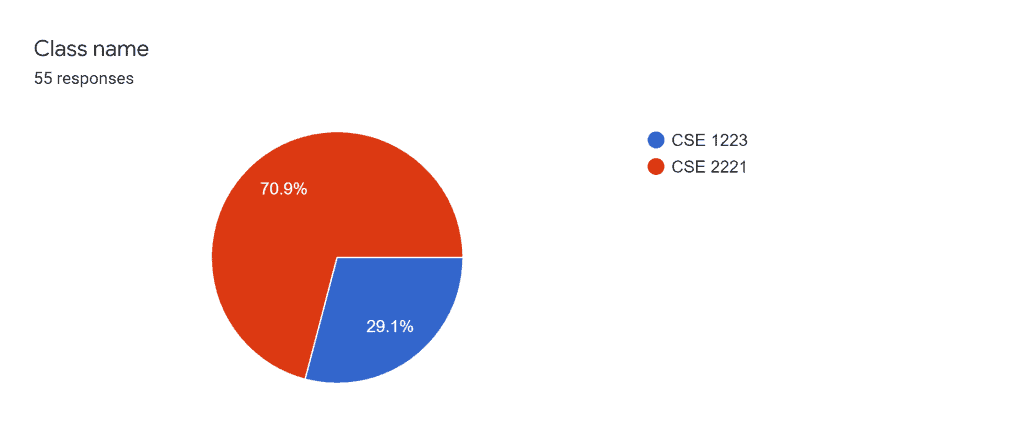
As always, I should preface that the number of responses is the collective response count over all 6 semesters of teaching. Regardless, you can see that I get more response from CSE 2221 than the other course which I no longer teach.
Similarly, I like to ask folks why they chose the course.
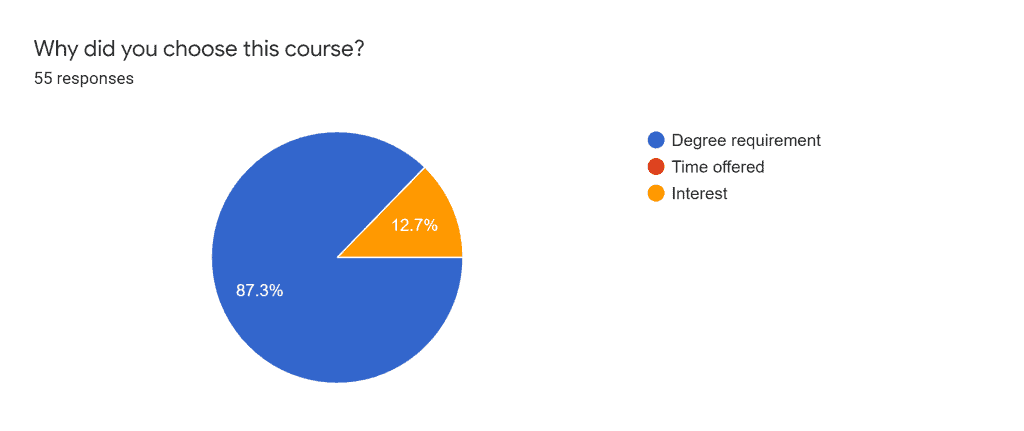
As you can see, over 6 semesters of teaching, the vast majority of students take the course because it’s required. That should give you an idea of the types of students I work with.
Level of Effort
Another question that I like to ask is how much effort do students put into the course.
![CSE 2221 (Autumn 2021): Level of Effort Bar Chart [fair: 1, satisfactory: 8, very good: 29, excellent: 17]](https://therenegadecoder.com/wp-content/uploads/2021/12/OnPaste.20211222-175010-1024x501.png)
As I’ve mentioned in the past, the course I currently teach is unfortunately somewhat of a weed out course. As a result, students often have to work very hard to pass. In this case, the vast majority of my students report 4 or higher on a scale of 5 in terms of effort needed to pass the course.
Contribution to Learning
Another interesting set of questions is around computer science knowledge trajectory. Specifically, I ask students to grade their knowledge before and after taking a course. In addition, I ask how much the course contributed to that knowledge. The idea here being that we want to know how much effort students have to expend outside of the course to succeed.
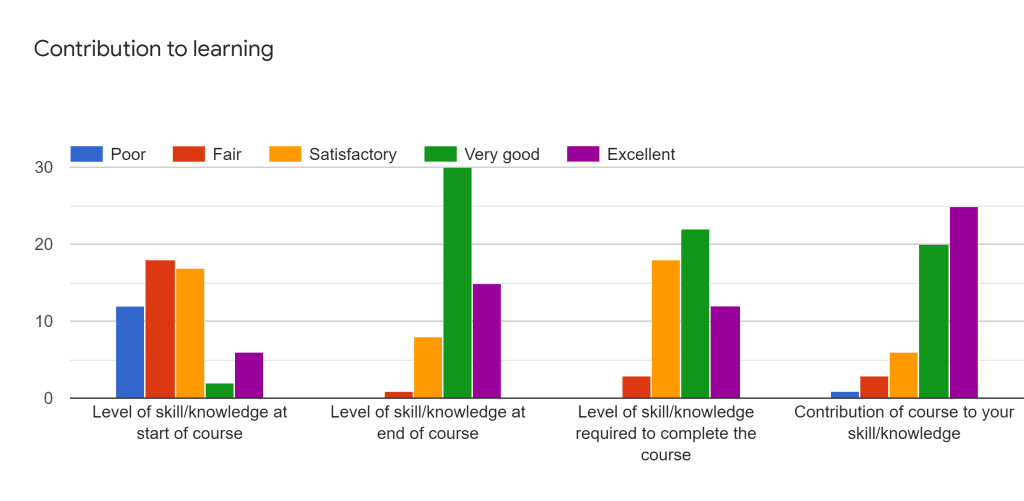
One thing I’m proud of in this graph is how much students believe they improved as a result of the course. The transition between the first two plots is awesome. I’m also quite fond of that fourth plot.
There are certainly areas to improve. For example, I don’t think students should be experts to pass the class, but students seem to believe that. Clearly, our assessment strategies aren’t aligned with what we’re teaching. Otherwise, students likely wouldn’t be so hard on themselves.
Skill and Responsiveness of Instructor
One of the sets of questions I like to ask is around my performance as an instructor. Unfortunately, I can’t show you the results of that because Google Forms has a bug where the labels don’t match the plot. As a result, I’ll show the old data (2020):
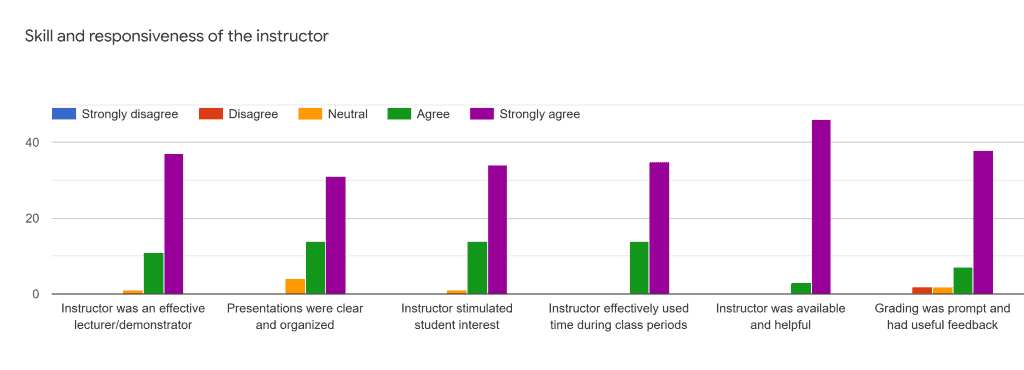
Of all the plots, these are the ones that give me the most joy. The more purple I see, the more I know my efforts as an educator are showing through.
Course Content
Yet another set of questions that I ask is around the course content. I don’t have a lot of control over this, but I like to try to use this as a gauge to see if I’m helping at all.
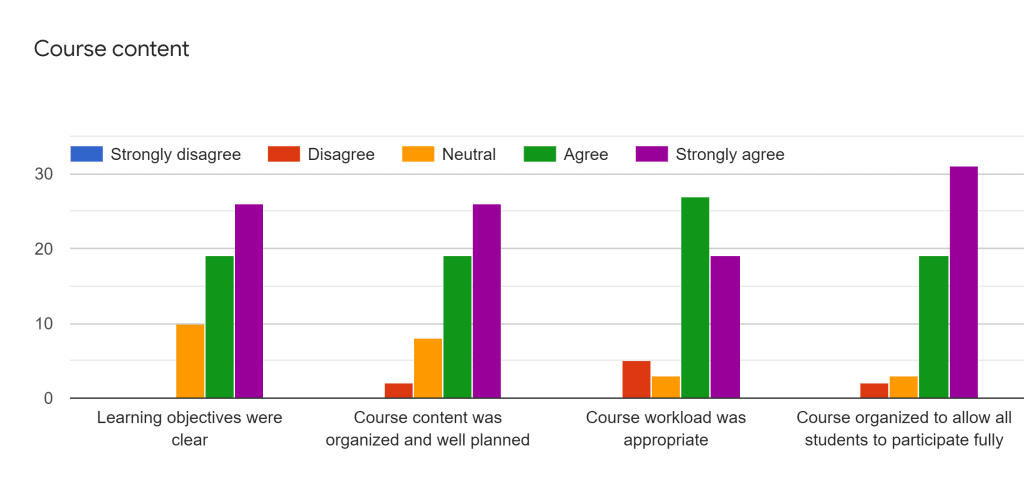
Generally, the responses here are positive. I would actually give a harsher assessment than most of the respondents, but I appreciate their candor.
Value
After I gather all the quantitative data, I like to leave some space for comments. In this section, I specifically ask students to share “what aspects of this course were most useful or valuable?” Generally, students don’t say too much, so I can more or less drop their comments wholesale:
The most useful thing that Software I taught me was what “good” code looked like. The class required code to not only run, but to be programmed to more professional standards.
Anonymous, Autumn 2021
Instructor feedback and brainstorming sessions
Anonymous, Autumn 2021
lectures
Anonymous, Autumn 2021
Learning about different types of classes and how to implement them, Learning how to read Javadocs
Anonymous, Autumn 2021
In general, I find that students don’t have a lot of valuable takeaways from the course, which is somewhat sad as an educator. That said, I understand why students don’t automatically see the value in a course because they aren’t applying the knowledge yet.
Improvements
Just like the last section except I ask students to share how they would improve the course:
I think preparation for the final was the weakest part of this course. In my opinion, the midterms, which required minimal studying in order to receive a good grade, gave the illusion that the final was going to follow the same kind of difficulty. This was definitely not the case, and I would have felt more prepared if the final exam review had covered much more difficult questions. The review featured questions that I thought were very easy to figure out, but were not the types of questions I faced on the final.
Also, I really liked the practice midterm on the CSE website. I think more practice worksheets and practice tests would be very helpful.
Anonymous, Autumn 2021
Rubrics specific to the projects
Anonymous, Autumn 2021
the projects r too hard even coming from previous experience
Anonymous, Autumn 2021
If there was a project midway that implemented lessons from several classes
Anonymous, Autumn 2021
Here’s where I start to point to the timing of the survey. Apparently, one of my students must have done poorly on the final because they didn’t think I adequately prepared them.
In general, I agree with them. I can always find ways to better prepare students for an exam. However, without giving them the literal questions, it’s sometimes hard to come up with material that they’ll be able to transfer to an exam. This is one of the many reasons why I hate exams as an assessment technique.
In addition, I do feel for this student. I’ve been in this situation a handful of times where I felt like a class was easy, so I stopped taking it seriously. Personally, I chalk that up to my fault, but I can understand why a student wouldn’t want to blame themselves if they knew they had “the ability” to do well.
With that said, this student has to take some of the blame for their failure. I wasn’t provided material to give students to prepare for the exam, so I made my own. Going forward, I know to make that material harder. Going forward, this student is going to have to prepare better and not assume an instructor can adequately determine every student’s preparedness on their behalf.
I think I’m particularly frustrated by this feedback because I tell students almost exactly what is going to be on the exam with the amount of points for each type of question. I don’t think at any time in my college career a professor did that for me. Also, I’m probably a little frustrated because the feedback comes off as fairly arrogant (more on that later).
All that said, I generally think it’s bad for folks in power (like me) to complain about the powerless (like my students), so I believe it’s my responsibility to sort of shut up and take it. After all, I see where folks like this are coming from, so I’ll try to provide better material going forward.
Testimonials
After I get some feedback around strengths and improvements, I like to leave a bit of space for students to say something nice about me. These are quotes I usually steal for applications and awards and stuff. Unfortunately, this time around I got a bit more criticism than praise:
For the most part, I enjoyed your style of teaching. You seemed very passionate about helping students which made it easier for me to talk to you about questions I had on projects and homework. However, I do have two criticisms.
Firstly, I would have liked to see final exam review questions that better reflected the difficulty of the exam. Personally, I felt that the final would be just as easy as the midterms (though others may have potentially found them difficult, I felt that they were very easy). I think more thorough preparation for the final and a greater emphasis on it being very difficult would have helped, although admittedly, it is entirely my responsibility to gauge the exam and study as I see fit. Still, I would have liked the review to be more difficult.
Secondly, I wasn’t the biggest fan of the “Assigning Experts” activities. In my opinion, I think that assigning students to learn the lesson of the day themselves defeats the entire purpose of a lecture. This was especially true during days entirely devoted to learning a specific data structure (Stack, Map, etc.). There were many times where I wondered if I could have simply skipped the Assigning Experts activities and simply learned the data structures from the slides and OSU CSE components library from my own dorm. Personally I felt that a lot of learning data structures was independent work, and relied a lot on the components library. I think it would be better to use the time spent on Assigning Experts activities to expand upon information already established in the components libraries, similar to the labs.
Other than that, I really enjoyed your teaching. You made it very clear that you were passionate about your students and wanted to give them the best chance at success in your class, you were also very helpful and open to questions.
Anonymous, Autumn 2021
You were awesome. Very relatable to us and by not using the conventional methods of teaching(scrolling only through the slides) and using methods to brainstorm and interact made the class really enjoyable and informative.
Anonymous, Autumn 2021
Jeremy cares a lot about students
Anonymous, Autumn 2021
He is a great teacher who fosters an environment where students do not feel too stressed to work answer questions in class.
Anonymous, Autumn 2021
Generally, I should know better than to focus on the criticisms. That said, everyone knows how hard that is. In this case, this particular student has doubled down on how poorly I prepared them for the final. In addition, they go on a weird rant about jigsaw, an active learning technique.
At this point, I think I’ve addressed the first point enough, so let’s talk about jigsaw (FYI: I know this goes against what I just said about shutting up, but I’m not exactly a rational being). In this class, we cover 5 or so data structures. Traditionally, this would be taught by more or less using a lecture to read through the API. Now, I find this incredibly boring and a terrible way of conveying the concepts. As a result, I usually run a jigsaw activity where a subset of students get the chance to deeply read up on a handful of methods before teaching them to their peers.
Now, the following quote is one of the biggest cop-outs against active learning in general:
“I think that assigning students to learn the lesson of the day themselves defeats the entire purpose of a lecture.”
In all my education training, I’ve learned lecturing is just not good enough alone. For example, here’s an article from 1998 that’s been cited over 550 times which states:
Some of the criticism and hesitation concerning active and cooperative learning seems to originate in the belief that these techniques are intended to be alternatives to, rather than enhancements of, lectures. We will counter this either-or misconception by surveying a wide variety of active-learning techniques that can be used to supplement rather than replace lectures
Faust, J. L., & Paulson, D. R. (1998). Active learning in the college classroom. Journal on excellence in college teaching, 9(2), 3-24.
Later in the article, these authors talk about the criticism they receive for adopting active learning. For example, they mention the “coverage problem”:
Foremost among the obstacles perceived by these faculty seems to be the “coverage problem”—that an instructor cannot cover as much material in a course incorporating active-learning techniques as in a course using exclusively lecture. A growing body of evidence suggests that students learn and retain more information when they are asked to engage it actively (see, for example, Springer and others, 1998)
Faust, J. L., & Paulson, D. R. (1998). Active learning in the college classroom. Journal on excellence in college teaching, 9(2), 3-24.
Now, the year is 2021, and that body of literature is massive. In fact, I would consider it criminal at this point not to include active learning in the classroom. So, here’s what I would pose to this student: stay home. I always tell students that they have the option not to come to class if they see no value in it.
Better yet, I’m a bit curious about what the alternative would be for them. Would they rather me just read the API to them? Can’t they do that at home? Or, you know, during the jigsaw activity? Ugh.
I suppose what frustrates me the most about the second comment is that this particular student clearly missed the point of these activities. If they’re so disengaged, they’re actually ruining the experience for other folks in their group. These are exactly the types of people that make the field of computer science so frustrating to be a part of because they’re “too good” to be team players.
Overall, when I think about both comments together, it feels like this student has a different concept of the purpose of education. It’s not my role to pour knowledge into their head. They actually have to work to build knowledge. I mean isn’t that the entire point of Bloom’s taxonomy? We create educational goals to get students to think at higher levels, and that process involves students doing something more than memorizing the words of a professor. Hell, I worry about the day this student takes a course setup as a flipped classroom .
.
Regardless, it’s worth pointing out that a couple of the other students said some nice things that I appreciate. In fact, it’s almost comical how one of the reviews (i.e., “using methods to brainstorm and interact made the class really enjoyable and informative“) directly opposes the critique. Maybe I should just shut up now.
Article Ideas
At the very end of the survey, I like to ask students for their thoughts around articles I could write for them. After all, I already use a lot of my own content to supplement their work. Here’s what they had to say:
What programming language should we learn now (2021) from educational institutions for a good future in software dev?
Anonymous, Autumn 2021
Loop invariants
Anonymous, Autumn 2021
Students in general tend not to share article ideas, but I was actually very pleased with the responses this time around! I’d definitely be interested in writing an article about loop invariants.
Assignment Survey
This semester, I piloted an assignment survey to gather data about the different assignments students were completing in the course. Currently, I’m in the process of creating a visualization dashboard to see all of this feedback. However, in the short term, check out the break down of each question:
Projects Under Review
One of the questions on the survey asks students which project they are reviewing. Here’s the breakdown of the review count for each project:
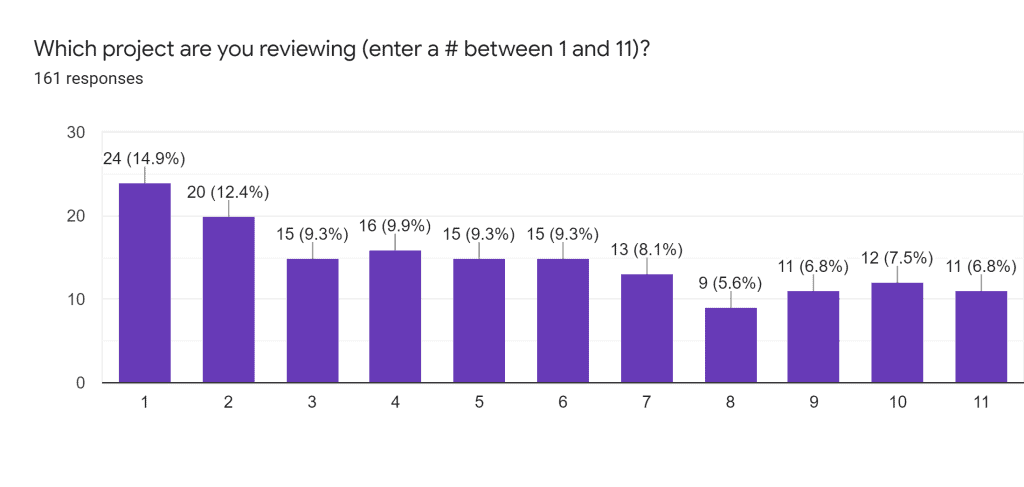
As you can see, students review earlier projects more often than later projects. I suppose this makes sense given the diminishing returns of value for each submission. That said, I was quite pleased with the results. I can’t really complain!
Rubric Satisfaction
This semester, I made rubrics for each project. Now, I had no clue if students were going to like these rubrics or not, so I added a question about student satisfaction to the survey. Here were the overall results:
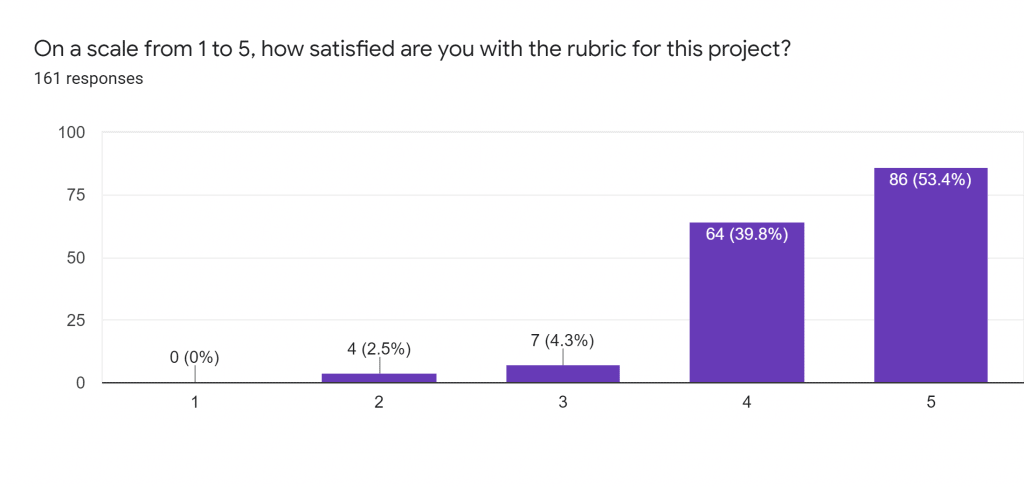
Now, I’m going to eventually need to disaggregate this data to see which rubrics people didn’t like. That said, in the short term, I’m quite pleased with this change! I’m glad students were more or less happy with the rubrics.
Time Spent on Project
Another piece of data I was interested in was the amount of time students were spending on projects. That way, I could prepare students ahead of time with an amount of hours they would need to set aside to complete their assignments. As a result, I ended up with this beautiful plot:
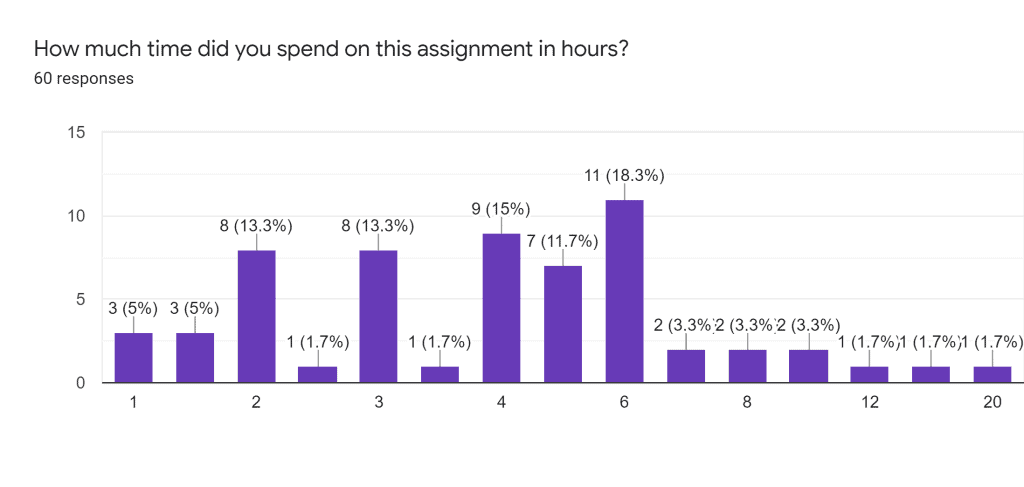
Again, this data is in aggregate, so we have no idea how this maps to individual projects. That said, there are some clear popular answers between 2 and 6 hours. Of course, I couldn’t help myself and plotted this data already per project:

Now, this is exciting data because I can see that the projects get progressively longer as the semester continues. Or at the very least, students are spending more time on the projects.
Going into next semester, I plan to show students this chart to give them and idea on how to prepare for work throughout the semester.
Student Evaluation of Instruction
As always, my students are asked to fill out a student evaluation of instruction through the university at the end of each semester. While I generally get high scores, I think it’s important for me to also acknowledge the bias in teaching reviews toward folks like myself. Here are the scores broken down by question and cohort:
| Question | Instructor Mean | Department Mean | College Mean | University Mean |
|---|---|---|---|---|
| The subject matter of this course was well organized | 3.91 | 4.22 | 4.26 | 4.33 |
| This course was intellectually stimulating | 4.31 | 4.18 | 4.20 | 4.24 |
| This instructor was genuinely interested in teaching | 4.81 | 4.28 | 4.41 | 4.48 |
| The instructor encouraged students to think for themselves | 4.84 | 4.29 | 4.39 | 4.44 |
| The instructor was well prepared | 4.72 | 4.24 | 4.34 | 4.40 |
| The instructor was genuinely interested in helping students | 4.91 | 4.28 | 4.43 | 4.47 |
| I learned a great deal from this instructor | 4.63 | 4.07 | 4.17 | 4.22 |
| The instructor created an atmosphere conducive to learning | 4.71 | 4.11 | 4.25 | 4.32 |
| The instructor communicated the subject matter clearly | 4.69 | 4.09 | 4.19 | 4.27 |
| Overall, I would rate this instructor as | 4.84 | 4.20 | 4.33 | 4.40 |
Now, I know I got a little heated around the testimonials, so let me share some of the nice comments I got this time around:
Information we needed to know. Hands down best instructor I’ve had so far in college. He also takes time outside of class to make sure his students understand the content and is understanding about adjusting deadlines as needed. I felt well prepared for every exam and project. Keep it up Jeremy!!
Anonymous, Autumn 2021
Jeremy Grifski was an amazing teacher. One of, if not the best, instructors I’ve ever had. He was absolutely fantastic and was always open to any questions. He was also always really understanding of any unlucky circumstances that may happen to students and always was flexible in accommodating. He also always make time for his students, especially outside of class.
Anonymous, Autumn 2021
Grifiki is a kind person who really cares for his students. He is enthusitic of teaching and try to let his students to engage. He always stay at lab and answer a lot of questions of his students. All in all, he is a great professor.
Anonymous, Autumn 2021
It’s always the 1% we latch onto, isn’t it? Anyway, I don’t have much to say about these scores. One of these days I’ll visualize the entire series like I did in my article on Using Python to Visualize the Potential Effects of COVID-19 on Course Evaluations. For now though, I’m trying to enjoy my break!
Changes
Now, here comes my favorite part of the reflection! Let’s talk about all the things I’m going to do differently next semester.
Assignment Keys
One thing that this course never had was assignment keys. I somewhat understand why they don’t exist from an academic integrity standpoint, but students complain to me every semester about not having access to them when studying. What finally pushed me to make them were my graders who didn’t have anything to reference when grading.
By the end of this past semester, I had created keys for the last handful of assignments. I have no clue if students liked them or not (perhaps something to add to the assignment survey). Regardless, I’m working on creating the full set now. That way, the 90% of students who don’t cheat have something to reference while they study.
Personal Slides
Since starting teaching, I’ve always used course slides that were provided to me. This semester I decided to try making my own. The idea here being that I could embed all my interactive activities in them.
Of course, now I’m thinking about using these slides to also remind students of projects, rubrics, and surveys. And, I even plan to use these new slides to share exam tips!
Project Checklists
This semester, I added rubrics. This was great because students could better prepare their assignments for grading. Now, I also want to make checklists for each project, so students are less likely to miss easy points. For example, we take points for not following proper procedures like including a name in the file. If students check the checklist, they’ll be less likely to forget their name.
Homework Templates
Homework is somewhat of the wild west. We ask students to prepare homework that is professional, but only a handful of students actually do. Now, I understand why. The assignments are only worth two points, so why spend time making it pretty?
As a result, I decided to make markdown templates, so students can just fill in the holes with their answers. This gives an added bonus of teaching students markdown! How can they say no?
Looking Forward
With all that said, I’d like to enjoy some of my break, so let’s call it quits here! Surely, you’ll see yet another reflection next semester. Thanks again for reading! If you want more, here are some of the previous reflections:
- Reflecting on My Fifth Semester of Teaching: Spring 2020
- Reflecting on My Fourth Semester of Teaching: Autumn 2019
- Reflecting on My Third Semester of Teaching: Summer 2019
Otherwise, take care!
Recent Posts
It's July 2024, and I have three chapters of my dissertation drafted! Two more and we'll be ready to defend.
In growing the Python concept map, I thought I'd take today to cover the concept of special methods as their called in the documentation. However, you may have heard them called magic methods or even...

